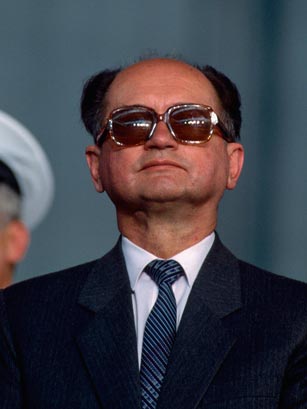
Polish Premier and Army General Wojciech Jaruzelski looks on during Soviet Premier Mikhail Gorbachev's arrival in Poland in July 1988
First Person
To my mind, the most important event of the '80s was the creation of the Polish Roundtable in February 1989 [which led to a coalition government with the ruling communists and the Solidarity trade-union movement led by Lech Walesa]. It was significant for three reasons. First, it lifted a huge burden from my shoulders. Second, it created a situation in which the sharp confrontation between political forces ceased to exist; that was particularly important considering the fact that our national temperament had often led to bloodshed. Finally, Poland's peaceful transition from totalitarian rule set an example for other countries in the region and opened the way for political change in the East bloc. I, of course, give full credit to the role of Mikhail Gorbachev, my great friend to this day. He himself used to say our Polish reforms were a great laboratory for perestroika.
Originally, I thought that even after reform we would be a socialist country with a strong private sector. But the further we went, the more I understood that this was not realistic. As we approached the Roundtable, I knew it was necessary to drop the doctrine of dominant state ownership and control of the economy in order to make it clear that we were ready to share political power. There was very strong opposition in my own camp, but as President and commander in chief of the army and the security forces, I was able to ensure that the transition occurred in a peaceful and flexible way.
Why wasn't it possible to achieve reform sooner? Everything must mature in its own time: grain, fruit, humans, as well as societies and even politicians. In 1981 the government was marching too slowly and Solidarity too fast. We were heading for a catastrophe. Just as the Prague spring of 1968 was ahead of its time, the Polish autumn of 1981 went beyond the historical realities of that period. We were severely limited by the Warsaw Pact.
When I imposed martial law in December 1981, it was everyone's fault because we failed to understand one another — and no one's fault because it was not the proper time. I made many mistakes and today would do many things differently. But my errors were more tactical than strategic. It took time for De Klerk to reach an understanding with Mandela, Arafat with Rabin. In 1981 the time was not yet right for Walesa and Jaruzelski to come to terms.
Premier of Poland from 1981 to 1989, General Wojciech Jaruzelski served as President from 1989 to 1990